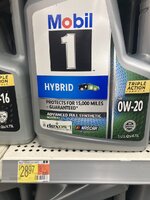Life is full of compromises and I imagine engine oils could be full of even more compromises than we know.
I wouldn't be surprised if new oils lack certain anti-wear additives that old formulas had, in order to satisfy new environmental regulations. Are new oil specs "deficient" in some way, or are modern oils uniformly better? To be even more specific, is a modern "cheap" oil like SuperTech Full Synthetic better than a wonder oil (like green, German Castrol) from 20 years ago?
I wouldn't be surprised if new oils lack certain anti-wear additives that old formulas had, in order to satisfy new environmental regulations. Are new oil specs "deficient" in some way, or are modern oils uniformly better? To be even more specific, is a modern "cheap" oil like SuperTech Full Synthetic better than a wonder oil (like green, German Castrol) from 20 years ago?


